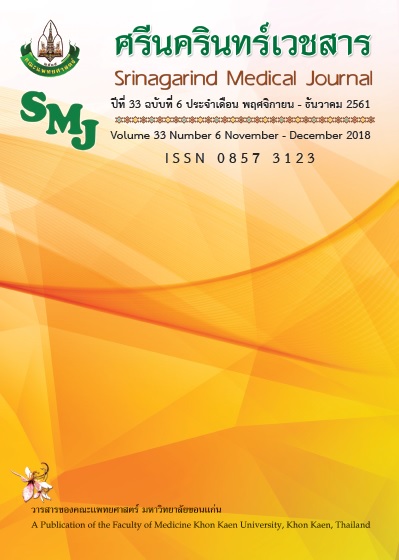Effect of Multidisciplinary Care on Blood Pressure in Chronic Kidney Disease Patients with Hypertension, Thatako Hospital: Preliminary Study
Keywords:
Chronic kidney disease, Multidisciplinary, Hypertension, โรคไตเรื้อรัง, สหสาขาวิชาชีพ, โรคความดันโลหิตสูงAbstract
การศึกษาเบื้องต้น: ผลการดูแลแบบสหสาขาวิชาชีพต่อการควบคุมความดันโลหิตในผู้ป่วยโรคไตเรื้อรังที่มีโรคความดันโลหิตสูง โรงพยาบาลท่าตะโก
ศิรินุช อุบลวัฒน์1, อัลจนา เฟื่องจันทร์2
1ภบ.นักศึกษาหลักสูตรเภสัชศาสตรมหาบัณฑิต มหาวิทยาลัยนเรศวร
2Ph.D.อาจารย์ประจำภาควิชาเภสัชกรรมปฏิบัติ คณะเภสัชศาสตร์ มหาวิทยาลัยนเรศวร
หลักการและวัตถุประสงค์: การทำงานแบบสหสาขาวิชาชีพมีส่วนทำให้การดูแลผู้ป่วยเป็นไปอย่างมีประสิทธิภาพ การศึกษานี้จึงศึกษาผลการดูแลแบบสหสาขาวิชาชีพต่อการควบคุมความดันโลหิตในผู้ป่วย โรคไตเรื้อรังที่มีโรคความดันโลหิตสูงเปรียบเทียบกับการดูแลตามปกติ ณ คลินิกโรคไต โรงพยาบาลท่าตะโก
วิธีการศึกษา: เป็นการศึกษาเชิงทดลองแบบสุ่มชนิดมีกลุ่มควบคุมแบบปกปิดทางเดียวในผู้ป่วยโรคไตเรื้อรังที่มีโรคความดันโลหิตสูง จำนวน 100 ราย โดยผู้ป่วยจะได้รับการสุ่มเข้ากลุ่มศึกษา คือ กลุ่มที่ได้รับการดูแลแบบสหสาขาวิชาชีพ 50 ราย และกลุ่มควบคุม คือ กลุ่มที่ได้รับการดูแลตามปกติ 50 ราย เป็นระยะเวลา 12 สัปดาห์
ผลการศึกษา: ค่าเฉลี่ยความดันโลหิตขณะหัวใจบีบตัวและคลายตัวของกลุ่มที่ได้รับการดูแลผู้ป่วยแบบสหสาขาวิชาชีพ เท่ากับ 133.14±13.56 และ 79.78±5.82 มิลลิเมตรปรอท ตามลำดับ ซึ่งแตกต่างจากกลุ่มที่ได้รับการดูแลแบบปกติที่มีค่าเฉลี่ยความดันโลหิตขณะหัวใจบีบตัวและคลายตัว เท่ากับ 142.02±19.02 และ 84.82±9.44 มิลลิเมตรปรอท อย่างมีนัยสำคัญทางสถิติ (p <0.05) นอกจากนี้ กลุ่มที่ได้รับการดูแลแบบสหสาขาวิชาชีพมีแนวโน้มเกิดปัญหาการใช้ยาลดลง มีการบริโภคโซเดียมน้อยลง และมีความรู้เรื่องโรค ยา และอาหารเพิ่มขึ้น เมื่อเปรียบเทียบกับก่อนได้รับการดูแลแบบสหสาขาวิชาชีพ (p<0.001) ทั้งนี้ หลังได้รับบริการแบบสหสาขาวิชาชีพ ผู้ป่วยมีความพึงพอใจอยู่ในระดับมาก (4.75 ± 0.32)
สรุป: การดูแลแบบสหสาขาวิชาชีพสามารถช่วยให้ผู้ป่วยโรคไตเรื้อรังที่มีโรคความดันโลหิตสูงควบคุมความดันโลหิตได้ดีขึ้น นอกจากนี้ ยังส่งเสริมให้ผู้ป่วยมีความรู้เรื่องโรค ยา และอาหารที่ถูกต้องเพิ่มขึ้น และลดปัญหาจากการใช้ยาได้
Background and Objective: The multidisciplinary teamwork play a crucial role in effective patient care. The present study aimed to study the effectiveness of multidisciplinary care on blood pressure control in chronic kidney disease patients with hypertension compared with standard care at chronic kidney disease patients clinic, Thatako hospital.
Methods: Single blinded randomized controlled trial was performed in 100 chronic kidney disease patients with high blood pressure. Fifty patients were randomized to the treatment group receiving multidisciplinary care, whereas other 50 patients were received the standard care for 12 weeks.
Results: The mean systolic blood pressure and diastolic blood pressure were significantly difference in the multidisciplinary care group (SBP 133.14 ± 13.56 mmHg; DBP 79.78 ± 5.82 mmHg) compared with the usual care group (SBP 142.02 ± 19.02; DBP 84.82 ± 9.44 mmHg) (p<0.05). In addition, the multidisciplinary care group experienced less drug-related problems, had lower sodium intakes, and higher score of knowledge than usual group (p <0.001). Patient satisfaction to multidisciplinary care was 4.75 ± 0.32.
Conclusions: Multidisciplinary care can help chronic kidney disease patients with hypertension to control their blood pressure. It also increased the patient knowledge of diseases, medicines and diets and decreased drug-related problems.
References
สมาคมโรคไตแห่งประเทศไทย, สำนักงานหลักประกันสุขภาพแห่งชาติ. คู่มือการจัดการดูแลผู้ป่วยโรคไตเรื้อรังระยะเริ่มต้น. พิมพ์ครั้งที่ 1. กรุงเทพฯ: บริษัท ยูเนียนอุลตร้าไวโอเร็ต; 2555.
Ingsathit A, Thakkinstian A, Chaiprasert A, Sangthawan P, Gojaseni P, Kiattisunthorn K, et al. Prevalence and risk factors of chronic kidney disease in the Thai adult population: Thai SEEK study. Nephrol Dial Transplant 2010; 25; 1567-75.
Kidney Disease Outcomes Quality Initiative (K/DOQI). K/DOQI Clinical practice guidelines on hypertension and antihypertensive agents in chronic kidney disease. Am J Kidney Dis 2004; 43 (Suppl 1): S1-290.
Luciano Ede P, Luconi PS, Sesso RC, Melaragno CS, Abreu PF, Reis SF, et al. Prospective study of 2151 patients with chronic kidney disease under conservative treatment with multidisciplinary care in the Vale do Paraiba, SP. J Bras Nefrol 2012; 34: 226-34.
Garcia-Garcia G, Martinez-Castellanos Y, Renoirte-Lopez K, Barajas-Murguia A, de la Torre-Campos L, Becerra-Muñoz LE,et al. Multidisciplinary care for poor patients with chronic kidney disease in Mexico. Kidney Int Suppl (2011) 2013; 3: 178-83.
สภาเภสัชกรรม. ปัญหาที่เกี่ยวกับการใช้ยา. ใน: เกณฑ์มาตรฐานผู้ประกอบวิชาชีพเภสัชกรรมของสภาเภสัชกรรม, 2544.
Strand LM, Mourley PC, Cipolle RJ, Ramsey R, Lamsam GD. Drug-related problem: their structure and function. DICP 1990; 24: 1093-7.
Santschi V, Lord A, berbiche D, Lamarre D, Corneille L, Prud home L, et al. Impact of collaborative and multidisciplinary care on management of hypertension in chronic kidney disease outpatients. JPHSR 2011; 2: 79-87.
Chen YR, Yang Y, Wang SC, Chiu PF, Chou WY, Lin CY, et al. Effectiveness of multidisciplinary care for chronic kidney disease in Taiwan: a 3-year prospective cohort study. Nephrol Dial Transplant 2013; 28: 671-82.
Chen PM, Lai TS, Chen PY, Lai CF, Yang SY, Wu V, et al. Multidisciplinary care program for advanced chronic kidney disease: Reduces Renal Replacement and Medical Costs. Am J Med 2015; 128: 68-76.
พัชนี นวลช่วย. การให้บริบาลทางเภสัชกรรมในผู้ป่วยโรคไตเรื้อรังที่แผนกผู้ป่วยนอกอายุกรรมโรคไต โรงพยาบาลท่าศาลา [วิทยานิพนธ์ปริญญาเภสัชศาสตรมหาบัณฑิต]. ภาควิชาเภสัชกรรมคลินิก: มหาวิทยาลัยสงขลานครินทร์; 2554.


